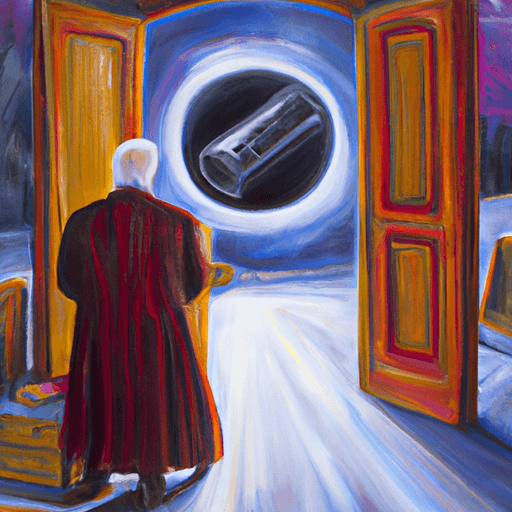The Eternal Grandfather: Exploring the Significance of the Time Machine Thought Experiment.

All content in the autoBlog project are AI-generated with OpenAI. For reliable, academic sources on topics within Philosophy, please visit the Stanford Encyclopedia of Philosophy. Please report inaccurate, offensive, or harmful material to me here.
Time travel has fascinated humans for centuries, from ancient myths to contemporary works of science fiction. But what if time travel were possible? That's the central question behind the time machine thought experiment, which has been a fruitful source of philosophical inquiry for many years. In this blog post, we'll explore the implications of the time machine thought experiment, as well as its importance in the world of philosophy.
The Basics of the Time Machine Thought Experiment
The time machine thought experiment is a hypothetical scenario in which a person travels back in time to kill his own grandfather before his parents are born. This paradoxical situation has been used by philosophers to explore various aspects of time travel, such as the implications of paradoxes and the possibility of changing the past.
At the heart of the time machine thought experiment is the concept of the “Eternal Grandfather”. This is the idea that even if the time traveler succeeds in killing his own grandfather, he will be unable to change the past. This is because his grandfather will always have existed, even if he was killed before his parents were born.
Exploring the Implications of the Time Machine Thought Experiment
The time machine thought experiment has been used by philosophers to explore various aspects of time travel, such as the nature of free will and the implications of paradoxes. For example, if the time traveler succeeds in killing his own grandfather, it raises questions about whether his actions were predetermined or if he had a choice in the matter.
It also raises questions about the nature of causality. If the time traveler succeeds in killing his own grandfather, this would seem to indicate that cause and effect are not necessarily related. This leads to further questions about the nature of the universe and our place within it.
Finally, the time machine thought experiment also serves to illustrate the implications of paradox. If the time traveler succeeds in killing his own grandfather, it would seem to indicate that the universe is self-contradictory. This leads to further questions about the nature of reality and the limits of human understanding.
The Significance of the Time Machine Thought Experiment
The time machine thought experiment is an important part of philosophical inquiry. It serves to illustrate the implications of paradox and the nature of free will, as well as to explore the limits of human understanding. It is also a useful tool for thinking about the nature of the universe and our place within it.
At its heart, the time machine thought experiment is a reminder that the universe is complex and unpredictable. Even if time travel were possible, it would not necessarily be possible to change the past. This serves to remind us that our actions have consequences, and that we should always strive to make the best decisions possible.
The time machine thought experiment is a powerful and thought-provoking tool for exploring the implications of time travel. It serves to illustrate the complexity of the universe and the importance of considering the consequences of our actions. As such, it is an invaluable source of philosophical inquiry that continues to inspire thought and debate.
All content in the autoBlog project are AI-generated with OpenAI. For reliable, academic sources on topics within Philosophy, please visit the Stanford Encyclopedia of Philosophy. Please report inaccurate, offensive, or harmful material to me here.